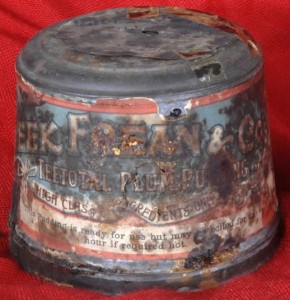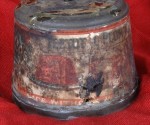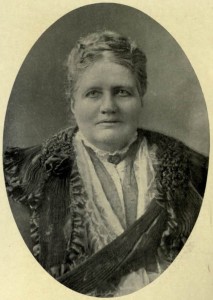 What is probably the oldest Christmas plum pudding in the world, tinned 112 years ago in 1899, has been found at the back of a kitchen cupboard in Poole, Dorset and donated to the National Museum of the Royal Navy at the Portsmouth Historic Dockyard in Hampshire. It was donated by a woman who found it in her cupboard after her husband’s death. She knew nothing about it other than the date stamped on the can — 1900 — and that it had been in her husband’s family for years.
What is probably the oldest Christmas plum pudding in the world, tinned 112 years ago in 1899, has been found at the back of a kitchen cupboard in Poole, Dorset and donated to the National Museum of the Royal Navy at the Portsmouth Historic Dockyard in Hampshire. It was donated by a woman who found it in her cupboard after her husband’s death. She knew nothing about it other than the date stamped on the can — 1900 — and that it had been in her husband’s family for years.
 The handsomely decorated tin marks it as “Peek, Frean & Co’s Teetotal Plum Pudding – London, High Class Ingredients Only.” Instructions on the bottom state “This pudding is ready for use but may be boiled for an hour if required hot.” Peek Frean was a cookies and confectionary company established in 1857. Within a few years they focused on making confections for export to distant locales like Australia and India, hence the sealed tins. The back of the container depicts children holding out plates, presumably to beg for more of that delicious teetotal plum pudding.
The handsomely decorated tin marks it as “Peek, Frean & Co’s Teetotal Plum Pudding – London, High Class Ingredients Only.” Instructions on the bottom state “This pudding is ready for use but may be boiled for an hour if required hot.” Peek Frean was a cookies and confectionary company established in 1857. Within a few years they focused on making confections for export to distant locales like Australia and India, hence the sealed tins. The back of the container depicts children holding out plates, presumably to beg for more of that delicious teetotal plum pudding.
This particular pudding was also destined for faraway lands, South Africa specifically. It’s a teetoal pudding because it was a special issue, commissioned by Victorian philanthropist and superintendent of the Royal Naval Temperance Society Agnes “Aggie” Weston. She ordered 1000 tins of brandyless Christmas plum pudding to be sent to Royal Navy sailors fighting in the Boer War. There’s a message from her on the tin as well: “For the Naval Brigade, In the Front, With Miss Weston’s Best Christmas & New Year, 1900, Wishes.” As far as we know, this is the only surviving tin of the 1000.
 The daughter of a lawyer, Agnes Weston received a religious education and was involved in missionary work and the temperance movement from an early age. While still in her 20s she opened a café (liquor-free, of course) for soldiers. When some of her regulars were posted overseas, she wrote to them. One of her correspondents shared her letter with a ship’s steward who wished he could get so nice a letter. Agnes heard about it and started to write to him. From then on, she was a warm benefactress of the Royal Navy.
The daughter of a lawyer, Agnes Weston received a religious education and was involved in missionary work and the temperance movement from an early age. While still in her 20s she opened a café (liquor-free, of course) for soldiers. When some of her regulars were posted overseas, she wrote to them. One of her correspondents shared her letter with a ship’s steward who wished he could get so nice a letter. Agnes heard about it and started to write to him. From then on, she was a warm benefactress of the Royal Navy.
Still advocating temperance, Agnes was allowed on board ships to give lectures on the virtues of sobriety. Surprisingly, this did not make her unpopular. Quite the opposite, in fact. She and her friend and partner in philanthropy Sophia Wintz raised money and eventually founded four hostels for sailors called “Sailor’s Rests.” Any sailor could get a clean bed and meal in the Rests. The Rests also provided baths and recreational facilities, and although there were temperance lectures and obviously none of the meals came with beer, anybody was welcome. They didn’t have to be sober. The idea was that sailors who had a nice place to sleep, enough to eat and wholesome activities to do wouldn’t be out barhopping and carousing.
Because of her genuine care and affection for the sailors (and her endless nagging about their drinking habits), she became known as Mother Weston or the Mother of the Navy. The success of the Rests didn’t keep her from supporting the sailors overseas. In addition to her copious personal correspondence, Agnes also printed a monthly newsletter and a journal for distribution to sailors on board ships.
In 1909 she published a book about her life’s work with the sailors of the Royal Navy, My Life Among the Bluejackets, in which she describes the great pudding caper of Ought Ought.
As Christmas drew near it occurred to one of us that a Christmas pudding for each man of the Naval Brigade would be a nice little present. Messrs. Peak, Frean & Co. carried out the order, and the puddings went off, each in its tin, “With Miss Weston’s good wishes,” in time to reach the front. They were passed on and were not hung up anywhere. A bronzed bluejacket on his return said to me:
“Directly Ladysmith was relieved you were outside the gates, and those puddings they were just splendid after living so long on mealies and mule flesh. We said, ‘Mother is here, and knows just what we want.’ They made the same remark as tobacco and other gifts were served out.”
In recognition of her lifetime of dedication to the health and welfare of Royal Navy sailors, Agnes Weston was made Dame of the British Empire in 1918. She died that same year and was buried with full naval honors. During World War II, a frigate named after Somerset beach town Weston-Super-Mare became known colloquially in the navy as “Aggie-on-Horseback” after the Weston who was still beloved by sailors even 22 years after her death.
The tin is not on display at the museum yet. It’s in need of some conservation first. It will briefly go on display in the Portsmouth Historic Dockyard’s upcoming Victorian Festival of Christmas between November 25th and 27th, along with rations from both World Wars.
You didn’t save this for the Livius Drusus Christmas Special??? Ed G.
I seriously considered it. You know I’m a sucker for theme shows, much like Merv Griffin. :giggle:
Most of the Temperancists make me want to go back in time and slap them. This is quite a charming story however. I am charmed.
She took temperance in a really positive direction, imo. It wasn’t about busting up saloons or making drinkers criminals, but rather trying to provide people who might otherwise have fallen through the cracks with some care and attention.
Which is exactly what should be done with drug addicts these days. 😉